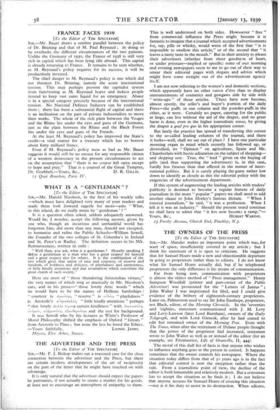THE ADVERTISER AND THE PRESS
[To the Editor of THE SPECTATOR] SIR,—Mr. F. J. Bishop makes out a reasoned case for the close connexion between the advertiser and the Press, but there are certain modern developments of the art of reciprocity on the part of the latter that he might have touched on with advantage.
It is only natural that the advertiser should expect the papers he patronises, if not actually to create a market for his goods, at least not to encourage an atmosphere of antipathy to them. This is well understood on both sides. Howsoever " free " from commercial influence the Press might become it is fantastic to imagine that a journal which accepted advertisements for, say, pills or whisky, would write of the first that " it is impossible to swallow this article,' or of the second that " it leaves a nasty taste in the mouth." But in their anxiety to please their advertisers (whether from sheer goodne ss of heart, or under pressure—implied or specific) some of our morning and evening newspapers seem to me to go out of their way to smear their editorial pages with slogans and advice' which might have come straight out of the advertisement agency itself.
I am not now referring to the women's and domestic sections, which apparently have no other raison d'être than to display announcements of cosmetics and gewgaws side by side with " write-ups " of those articles. These have now become, almost openly, the seller's and buyer's portion of the daily Press—the puffs in one column and the powder-puffs in the other, as it were. Certainly no paper, catering for the public at large, can live without the aid of the draper, and no great harm is done, even in the higher journalistic sense, by giving the draper a quid pro quo in his appropriate corner.
But lately the practice has spread of transferring this corner to the so-called leading columns of the journal, and there it looks—well, shall we say out of place ? I have one particular morning organ in mind which recently has followed up, or diversified, its " Opinion " on agriculture, Spain and Mr. Chamberlain with hectic adjuration on the subject of shopping— and shopping now. True, the " lead " given on the buying of gifts (and thus supporting the advertisers) is, in this case, hardly less fatuous than that offered in the matter of inter- national politics. But it is surely playing the game rather low down to identify as closely as this the editorial policy with the exigencies of the advertisement department.
If this system of augmenting the leading articles with traders' publicity is destined to become a regular feature of daily journalism in the more " popular " papers we shall need to add another clause to John Morley's famous dictum. "When I entered journalism," he said, " it was a profession. When I left it it was an industry." Should the present trend continue we shall have to admit that " it has now become a ramp."—






































 Previous page
Previous page